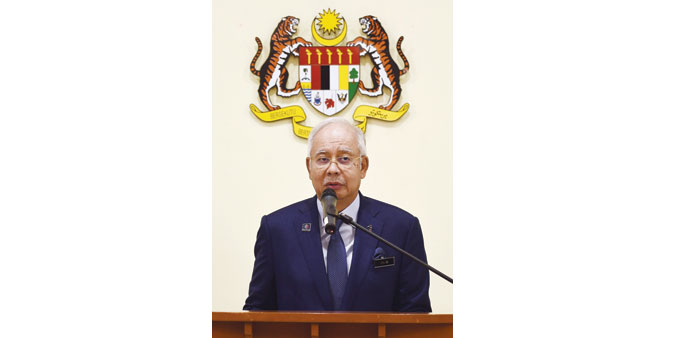Malaysia’s Prime Minister Najib Razak addresses the media at his office in Putrajaya yesterday. Malaysia will inject $4.6bn to bolster the stock market and spend millions more dollars on infrastructure projects, Prime Minister Najib Razak said, announcing a fresh bid to stimulate the slowing economy.
AFP
Kuala Lumpur
Malaysia will inject up to $4.6bn to bolster its stock market and will spend tens of millions of dollars on infrastructure projects to try to stimulate the slowing economy, Prime Minister Najib Razak said yesterday.
Najib, who is also finance minister, said up to 20bn ringgit ($4.6bn) would be used to reactivate the dormant equity investment firm ValueCap, which was set up in 2002 to invest in undervalued local firms.
The country has seen a 9% plunge in its stock market this year.
But Najib’s announcement saw the index record its biggest advance in over two years, surging 2.3% at the close.
“To protect the economy from the risk (of global uncertainty sparked by concerns over China’s economy), the government will implement the various measures to maintain the growth momentum,” he told reporters.
Malaysia’s economy grew at its slowest pace in nearly two years in the second-quarter, amid a plummeting currency and political turmoil.
Najib said the ringgit had declined 26.3% against the dollar compared to a year earlier.
Allegations of financial impropriety involving Najib, which he strongly denies, have become the biggest crisis of his six-year tenure.
They centre on claims that hundreds of millions of dollars went missing in deals involving state-owned investment company 1Malaysia Development Berhad (1MDB), which he launched in 2009.
In July The Wall Street Journal revealed that Malaysian investigators had found nearly $700mn in mysterious deposits in Najib’s personal bank accounts.
His government has since admitted the deposits were made, calling them “political donations” from Middle Eastern sources but refusing to give further details. It denies they were linked to IMBD.
“The government remains committed in helping to complete the investigation in relation to the investments in 1MDB in a transparent way,” Najib said yesterday.
Second-quarter growth was 4.9%, down from 6.5% in the same period last year, as both exports and private consumption weakened.
Future growth prospects for the economy – which is heavily reliant on energy exports – have been clouded by the slump in world oil prices of up to 52%.
Najib, however, said Malaysia would not impose capital controls because the economy was stronger than during the Asian financial crisis of 1997-98.
The government “has no intention to introduce capital controls”, he told reporters.
Najib announced that the industrial sector would be exempted from import duties on items like spare parts and equipment used for research and development.
An extra 80mn ringgit would be allocated to promote the country to bolster the tourism industry, an important foreign exchange earner.

